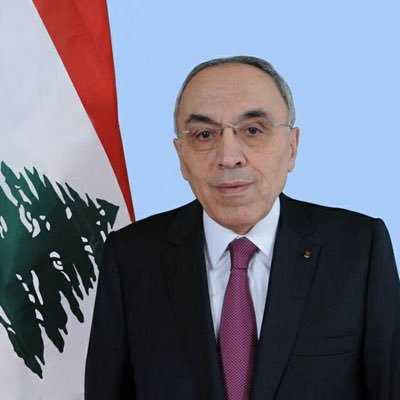
نص مقابلة باللغتين العربية والإنكليزية مع الوزير السابق يوسف سلامة/اتفاقية الهدنة لم تعد تكفي وربما يكون الحل في اتفاقية سلام!
نقلاً عن موقع أخباركم-أخبارنا/ناديا شريم/24 أيلول/2025
بعد مرور ساعات على خطاب رئيس الجمهورية جوزاف عون في الأمم المتحدة حيث شخص الأزمة اللبنانية وطالب المجتمع الدولي بمساعدة لبنان للخروج من تلك الأزمة،اختلفت اراء الاطراف السياسية تماما كما اختلفت حول الكلام الاخير للموفد الاميركي توم باراك الذي اعتبر ان اللبنانيين “يتحدثون كثيرا لكنهم لا يعملون شيئا”
لكن ما هو رأي رئيس “لقاء الهوية والسيادة “الوزير السابق يوسف سلامه عن هذين الموضوعين؟
يقول سلامه ” أن ألقراءة الأولى لخطاب الرئيس توحي بأن فخامته وصف وصفًا دقيقًا الحالة اللبنانية ودور ورسالة لبنان في المنطقة والعالم، إنما بعد أن تعمّقت أكثر بمضمون الكلمة أرى أنه طغى عليه نبرة الاستجداء إذ أنه كان يطلب من العالم أن يساعدنا على استعادة سيادتنا وبلورة هويتنا الوطنية بينما كان يُفترض أن يقول نحن نعمل على استعادة السيادة وبلورة الهوية. وبموازاة ذلك التفّ على الحقيقة عندما قال نفّذنا ما علينا من ورقة التفاهم اللبنانية الأميركية بخصوص تطبيق القرار ١٧٠١ بينما في الواقع التزمنا انشائيًا فقط بذلك.”
كلام براك
ويضيف :” بعدما أخذت الحكومة القرار بحصرية السلاح وكلّفت الجيش تنفيذه عادت ورحبّت بخطة الجيش التي ظلّت طي الكتمان ولم تطلب منه تنفيذها وهنا يأتي كلام المبعوث الأميركي توم باراك في حديثه الأخير تأكيدًا لصحة ما أقول.”
إلى ذلك لفت سلامه إلى أن كلمة فخامة الرئيس خلت من جملة “إنهاء حالة الحرب مع إسرائيل” والعودة إلى اتفاق الهدنة على الأقل، علمًا أنّ اتفاقية الهدنة لم تعد تكفي وحدها وقد يتطلب الموضوع مزيدًا من الحكمة والجرأة للولوج إلى اتفاقية سلام، وعندها فقط يكون لبنان أمينًا على دوره ورسالته ويقوم بما يتوجّب عليه ليساعد المنطقة على استعادة استقرارها ورفاهية شعبها.”
خريطة الطريق
وما هي خريطة الطريق التي يجب اعتمادها لحل الأزمة اللبنانية؟ يجيب سلامه ؛”قبل أن نرسم خريطة الطريق ونَصِفَ العلاج القادر على استنهاض لبنان من الحالة التي يعيشها علينا أن نُشخّص مرضه بتأنٍّ.
ففي الواقع عانى لبنان منذ قيام دولة لبنان الكبير منذ ما يقارب المئة عام من ازدواجية الولاء والانتماء والجوع إلى السلطة من جهة، قابلها ازدواجية القلق والخوف والجوع إلى السلطة أيضًا من جهة ثانية.
في المقابل فإن الوجه الإيجابي لدولة لبنان الكبير تجسّد بالرغبة بالحياة معًا مسيحيين ومسلمين وبتأسيس ثقافة الحياة المشتركة ولو على حساب سنوات من السقطات واللاستقرار.”
اضاف :”لقد علّمتنا السنوات العجاف التي مرّت على لبنان الكبير أنّه أضحى حاجة وضرورة لجميع أبنائه باستثناء قلّة محدودة على وشك الانقراض فور استعادة لبنان سيادته المطلقة التي فقدها منذ أكثر من نصف قرن وقد يستعيدها قريبًا.
من هنا نستخلص في هذا الاطار أننا على وشك أن نتخطى أزمتي الولاء والانتماء.”
الجوع للسلطة
واردف :”يبقى علينا أن نتخطى أزمة الجوع إلى السلطة، هذا الوباء الذي أصاب شعبنا بمسيحييه ومسلميه على السواء، وفي هذا الاطار يجب الإضاءة أنّ الخارج بمختلف تلاوينه الذي تمكّن من سلطة القرار اللبناني بوجهيها الأمني والسياسي على مدى عقود مستفيدًا من تفسخات المجتمع في الماضي قد نصّب منظومة تحكّمت بلبنان طيلة هذه العقود فتمكّنت من نهب المال العام وإفقار شعبها الذي حوّلته فريسة لأطماعها السلطوية والمادية بحيث تحوّلت إلى قوة احتلال داخلية أفرغت النظام الديمقراطي من معناه بعدما حوّلت الشعب إلى سلعة والانتخابات إلى سوق للمزاد والمناقصات في آن.”
لا اصلاح مع هذه المنظومة
وشدد رئيس “لقاء الهوية والسيادة” :”أمام هذا الواقع تأكّد لنا أنه يستحيل تطوير النظام لمعالجة مرض السلطة في لبنان بوجود هذه المنظومة المتحكّمة التي لا يمكن الركون اليها لتسهيل مهمة القضاء على نفسها، لذلك أرى أنه من الأجدى المطالبة بانتداب حضاري على لبنان يساعدنا على الاتفاق على نظام دستوري يحمي التنوّع ويؤسس لروح المواطنة بين اللبنانيين التي نحتاجها لتكريس الوحدة الوطنية الكفيلة وحدها بصدّ الأخطار عن لبنان.”
الولايات المتحدة
وختم :”وفي هذا الإطار أقترح أن تكون الولايات المتحدة الأميركية هي الدولة المنتدبة والضامنة على أن تتحمّل مسؤولية مساعدة لبنان على تبني ونشر ثقافة السلام في المنطقة انسجامًا مع طبيعة تكوينه ورسالته من جهة، وعلى بناء المؤسسات الحديثة والتفاهم على سدّ الثغرات الدستورية من جهة ثانية، كل ذلك مقابل نسبة مئوية يدفعها لها لبنان من قيمة دخله القومي هو الذي يعاني من سرقة القسم الأكبر من هذا الدخل على يد المنظومة الحاكمة والمتحكمة.”
Salameh to Our Website: The Armistice Agreement is No Longer Enough, and the Solution May Lie in a Peace Agreement
Akhbarkum – Akhbarna/Nadia Shreim/Translated by Massoud Mohamed
Hours after President Joseph Aoun’s speech at the United Nations, in which he diagnosed the Lebanese crisis and called on the international community to help Lebanon emerge from it, political parties expressed divergent views—just as they did regarding the recent statement by U.S. envoy Tom Barrack, who said that the Lebanese “talk a lot but do nothing.”
But what is the opinion of former minister Youssef Salameh, head of the “Identity and Sovereignty Gathering,” on these two matters?
Salameh says:
“My first reading of the President’s speech suggested that His Excellency gave an accurate description of the Lebanese situation and of Lebanon’s role and mission in the region and the world. But when I delved deeper into the content, I found that it carried a tone of pleading, as he was asking the world to help us regain our sovereignty and shape our national identity, whereas he should have said that we are working to restore sovereignty and consolidate our identity. In parallel, he sidestepped the truth when he claimed that we had fulfilled our obligations under the Lebanese-American memorandum concerning the implementation of Resolution 1701, when in fact our commitment was merely rhetorical.”
Barrack’s Remarks
He adds:
“After the government decided on the exclusivity of arms and tasked the army with its implementation, it then welcomed the army’s plan but kept it under wraps and never asked the army to enforce it. Here lies the validity of U.S. envoy Tom Barrack’s recent remarks, which confirm exactly what I am saying.”
Salameh further pointed out that the President’s speech omitted the phrase “ending the state of war with Israel” and returning at least to the Armistice Agreement, noting that the Armistice Agreement is no longer sufficient on its own. The situation may require more wisdom and courage to move toward a Peace Agreement. Only then will Lebanon truly fulfill its role and mission, doing what is required to help the region regain its stability and ensure the well-being of its people.
The Roadmap
What is the roadmap that should be adopted to resolve Lebanon’s crisis? Salameh answers:
“Before drawing the roadmap and prescribing the treatment capable of reviving Lebanon from its current state, we must carefully diagnose its illness.
In reality, since the founding of Greater Lebanon nearly a hundred years ago, Lebanon has suffered from a duality of loyalties and a hunger for power on one side, and from anxiety, fear, and equally a hunger for power on the other.
On the positive side, the spirit of Greater Lebanon was embodied in the desire of Christians and Muslims to live together and to establish a culture of shared life, albeit at the cost of years of setbacks and instability.”
He added:
“The lean years that passed over Greater Lebanon have taught us that it has become a necessity for all its citizens—except for a small minority that is on the verge of extinction once Lebanon regains its absolute sovereignty, which it lost more than half a century ago and may regain soon. From here, we conclude that we are close to overcoming the crises of loyalty and belonging.”
The Hunger for Power
He continued:
“What remains is for us to overcome the crisis of hunger for power, this epidemic that has afflicted our people—Christians and Muslims alike. In this context, it must be noted that external powers of various kinds, which have controlled Lebanese decision-making both in security and politics for decades by exploiting the fractures of society, appointed a system that has ruled Lebanon throughout these decades. This system succeeded in looting public funds and impoverishing its people, turning them into prey for its lust for power and wealth, becoming an internal occupying force that emptied democracy of its meaning by transforming the people into a commodity and elections into an open market for auctions and bargains.”
No Reform With This System
The head of the “Identity and Sovereignty Gathering” stressed:
“In light of this reality, it has become clear to us that it is impossible to reform the system to treat Lebanon’s power-disease while this entrenched system still exists. We cannot rely on it to facilitate its own demise. Therefore, I believe it is more useful to call for a ‘civilized mandate’ over Lebanon that helps us agree on a constitutional system that protects diversity and establishes a spirit of citizenship among Lebanese—a necessity to consolidate national unity, which alone can shield Lebanon from dangers.”
The United States
He concluded:
“In this context, I propose that the United States of America be the mandated and guarantor state, assuming responsibility for helping Lebanon adopt and spread a culture of peace in the region in line with its nature and mission on the one hand, and for building modern institutions and addressing constitutional gaps on the other. All of this would be in exchange for a percentage of Lebanon’s national income—income that is already being stolen in large part by the ruling and controlling system.”
سلامه لموقعنا: اتفاقية الهدنة لم تعد تكفي وربما يكون الحل في اتفاقية سلام! (فيديو – المقابلة بلغتين العربية والإنكليزية)





















